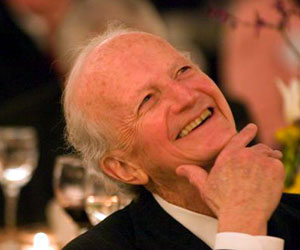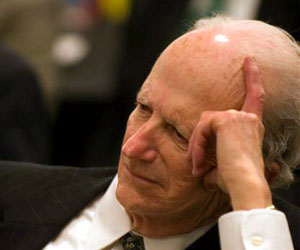Becker will receive highest civilian honor: Presidential Medal of Freedom
By William HarmsNews Office
  The photos of Gary Becker shown here were taken at the events that were held when the Becker Center on Chicago Price Theory at the Graduate School of Business was named. | |
Gary Becker, a University economist and pioneer in applying the economic theory of human capital to show ways in which individual and family decisions are made on the basis of economics, is one of eight people to receive the 2007 Presidential Medal of Freedom, the nation’s highest civilian honor, the White House announced Monday. President Bush will award the Medals of Freedom to the recipients at a ceremony Monday, Nov. 5.
Becker, University Professor in Economics, Sociology and the Graduate School of Business, is one of few economists to have received the Presidential Medal of Freedom and also is one of the few to receive both the Medal of Freedom and the National Medal of Science, which he received in 2000. His teacher, the late University economist Milton Friedman, also received a Presidential Medal of Freedom.
The Medal of Freedom was established by President Harry Truman in 1945 to recognize civilians for their service during World War II, and it was reinstated by President John Kennedy in 1963 to honor distinguished service.
“I am surprised by my selection, yet also highly appreciative of receiving this award,” Becker said. “I am honored to join the distinguished persons who have received the Presidential Medal of Freedom during the past 60 years.”
Philip Reny, the William C. Norby Professor in Economics and the College, and Chair of Economics, said, “It is impossible to understand how markets work and why without a thorough understanding of the work of Gary Becker. Gary’s contributions have redefined the domain on which economic analysis is performed, and they have dramatically expanded our appreciation of how market-based incentives affect decision-making. Whether one is interested in female labor force participation, the economics of discrimination, the rationality of crime, or the effects of evolution on economic behavior, one simply cannot avoid finding seminal contributions of Gary Becker. His receiving the Presidential Medal of Freedom is wonderful news. He’s a great choice.”
Becker, who received the Nobel Memorial Prize in Economic Sciences, has continued to do important new work on how economic decisions influence people’s lives. He has recently written “Health as Human Capital: Synthesis and Extensions,” and co-written “The Market for Illegal Goods: The Case of Drugs,” “Education and Consumption: The Effects of Education in the Household Compared to the Marketplace,” and “Evolutionary Efficiency and Mean Reversion in Happiness.”
In 2000, he published Social Economics, co-written with Kevin Murphy, the George J. Stigler Distinguished Service Professor in the GSB.
Becker is married to Guity Nashat Becker, who is a professor of history at the University of Illinois, Chicago, and a co-author with him on a book of essays, The Economics of Life, published in 1997. He published Accounting for Taste in 1996.
Becker’s research has extended economic analysis to decisions made by families, discrimination against minorities, crime and gender issues. His work looks at diverse aspects of human behavior that were previously considered to be largely irrational. Assuming that people behave rationally in attempting to make the most of their lives, he also has been able to apply economic theory to the study of relationships among individuals.
His 1957 book (his doctoral dissertation), The Economics of Discrimination, combines economic analysis with a study of prejudice against minorities.
In his 1964 book, Human Capital, he developed the idea that an investment in a person’s education and training was similar to business investments in new equipment.
In his 1981 book, A Treatise on the Family, he expanded that work to a study of the interactions within a family, including those between parents and children, husbands and wives, and among siblings. Becker concluded that women’s entry into the work force and their increased earning power have reduced demand for children, because women’s time has become more valuable.
The GSB houses a University-wide research center that was named in Becker’s honor in 2006. The Becker Center on Chicago Price Theory builds on the rich tradition of Chicago price theory that emphasizes the fundamental role of markets and incentives in understanding and improving all aspects of modern life.
Becker received an A.B. from Princeton in 1951 and his Ph.D. in Economics from Chicago in 1955. He was an Assistant Professor in Economics at Chicago from 1954 to 1957, and then taught at Columbia University from 1957 to 1969, when he returned to Chicago as a Visiting Professor. He was named Professor in Economics in 1970. He also became a senior fellow of the Hoover Institution in 1990 and is the recipient of numerous honorary degrees.
Becker is a founding member of the National Academy of Education and a fellow in the American Statistical Association, the Econometric Society, and the American Academy of Arts and Sciences. He is a member of the National Academy of Sciences, the American Philosophical Society, the International Union for the Scientific Study of Population, and the American Economic Association, of which he was president in 1987.
Becker writes a blog with Richard Posner, a judge on the U.S. Court of Appeals for the 7th Circuit and a Senior Lecturer in the Law School.
![[Chronicle]](/images/sidebar_header_oct06.gif)